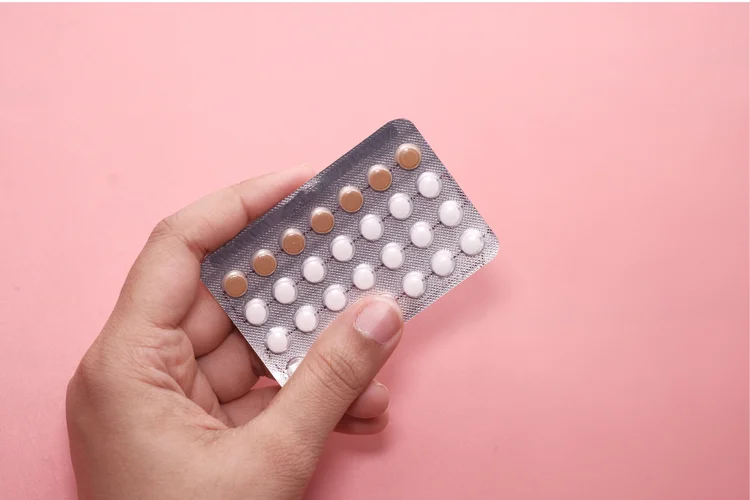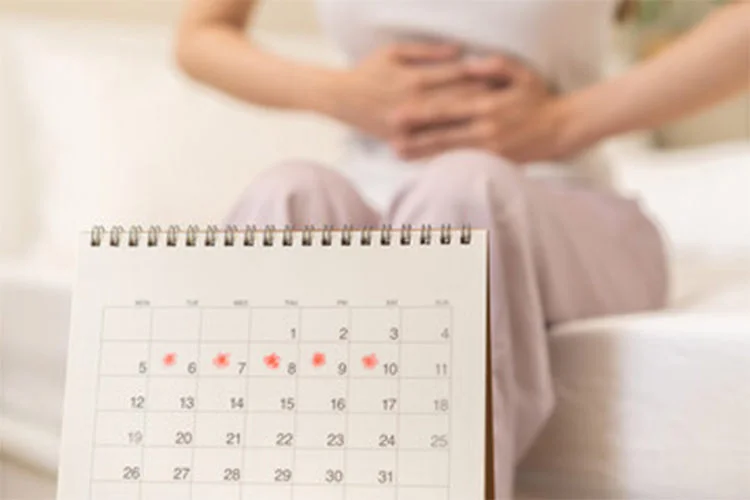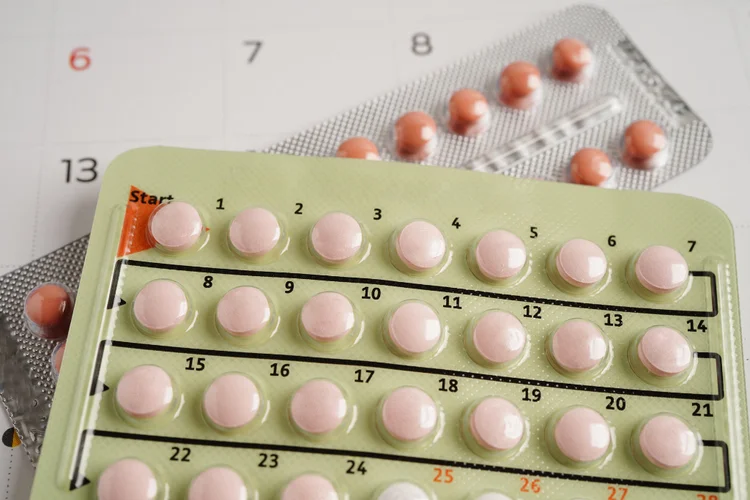Birth Control Pills Singapore
What Are Birth Control Pills?
Birth control pills, also known as oral contraceptives, are
daily medications used to help prevent pregnancy and regulate reproductive
health. Some types of birth control pills also help ease menstrual cramps and
stabilise hormone levels.
While birth control pills are intended for ongoing use, emergency contraception (often called
the morning-after pill) is meant for use shortly after unprotected sex. Period delay pills,
which contain a type of progestin, can also be used to temporarily postpone menstruation for
specific occasions.

How Does a Birth Control Pill Work?
Birth control pills use synthetic hormones, oestrogen and progestin, to regulate natural reproductive functions and reduce the chances of conception in several ways:
- Inhibiting Ovulation – The hormones prevent the usual rise in luteinising hormone (LH) and follicle-stimulating hormone (FSH)Z, which are needed for the release of an egg.
- Thickening Cervical Mucus – Progestin makes the mucus at the cervix thicker, creating a barrier that makes it harder for sperm to pass through.
- Changing the Uterine Lining – The endometrial lining remains thin due to the increased level of hormones, making it less favourable for implantation if fertilisation does occur.
The contraceptive effects are temporary. Once you stop taking the pill, your natural cycle and fertility typically resume.

Types of Birth Control Pills
Combination Pills
Combination pills include both oestrogen and progestin, which work in tandem to prevent ovulation and modify the cervical mucus and uterine lining. These are commonly taken in either 21-day or 28-day cycles.
- In a 28-day pack, you take active hormone pills for 21 or 24 days, followed by a few days of placebo pills which do not contain hormones. These placebo pills trigger withdrawal bleeding, similar to a period.
- In a 21-day pack, all pills contain active hormones. You stop for seven days after completing the pack, during which bleeding occurs.

Other Uses of Birth Control Pills
Apart from contraception, birth control pills are frequently used to manage various hormone-related or menstrual conditions:
- Menstrual Regulation – Helps manage irregular periods, painful menstruation (dysmenorrhoea), and heavy menstrual bleeding (menorrhagia).
- Premenstrual Relief – Certain formulations may help relieve symptoms of premenstrual syndrome (PMS) or premenstrual dysphoric disorder (PMDD), such as mood swings, irritability, or bloating, by maintaining more stable hormone levels.
- Polycystic Ovary Syndrome (PCOS) – Can assist in regulating menstrual cycles and reducing elevated androgen levels, which may help improve acne and excessive hair growth (hirsutism).
- Endometriosis – Helps suppress ovulation and limit the activity of endometrial tissue, which may reduce pelvic pain and other related symptoms.
- Hormone-Related Migraines – Continuous or extended-cycle birth control pills may help minimise hormone fluctuations that trigger migraines in some individuals.
The suitability of these uses varies depending on individual health conditions and the specific formulation of the pill. It is advisable to consult a doctor to determine whether birth control pills are appropriate for your specific needs.
Side Effects of Birth Control Pills
Most users tolerate birth control pills well, though some may experience side effects due to hormonal changes. Common symptoms include:
- Nausea or headaches – May occur in response to oestrogen-related hormonal shifts.
- Breast tenderness – Can result from hormonal changes and water retention.
- Mood fluctuations – Related to hormonal effects on brain chemicals like serotonin.
- Spotting or breakthrough bleeding – Light bleeding between periods is common, especially when starting the pill.
Over time, side effects usually ease as the body adapts. However, long-term use may increase the risk of more serious conditions such as:
- Venous thromboembolism (VTE)
- Elevated blood pressure
- Stroke
- Heart attack (myocardial infarction)
The risk is higher in people who smoke, have hypertension, cardiovascular disease, or a history of blood clots. If you fall into any of these categories, consult a doctor before starting or continuing the pill.
Birth Control Pills Price in Singapore
At healthscreening.sg, we provide a range of contraceptive and hormone-related services, including birth control pills, morning-after pills, period delay pills, and hormone testing. Our current prices are:
| Test/Treatment | Price* |
|---|---|
| Consultation | From $49.05 |
| Teleconsultation | From $38.15 |
| Medication | |
| Birth Control Pill (Yaz®) | $43.60 (per box of 40 tablets) |
| Emergency Contraceptive Pill (Ella®) | $43.60 |
| Period Delay Pill - Noresthisterone | $0.76 per tab |
| Hormone Tests | |
|
Amenorrhoea (Hormone) Profile 3 Testosterone, Estradiol (E2), Free T4, Thyroid Stimulating Hormone (TSH), Follicle Stimulating Hormone (FSH), Luteinising Hormone (LH), Prolactin This test is recommended for individuals with irregular menstrual bleeding and should be conducted between days 2 to 5 of the menstrual cycle for optimal results. |
$130.80 |
|
Female Acne/Weight Gain Screen** Testosterone, Estradiol, Progesterone, TSH, Cortisol, FSH, LH, Prolactin, DHEAS, SHBG This test is recommended for individuals with suspected hormonal acne and should be conducted between days 2 to 5 of the menstrual cycle for optimal results. |
$218 |
| Ultrasound | |
| Ultrasound Pelvis (Transabdominal) | $207.10 |
| Ultrasound Pelvis (Transvaginal) | $207.10 |
*Prices are NETT and inclusive of GST.
**Test must be done between 8:30 AM and 10:00 AM for accuracy.
Hormone testing packages are also available. Contact
us for more information.
How to Use Birth Control Pills?
To maintain consistent protection, birth control pills should be taken at the same time daily.
21-Day Regimen
- Take one active pill each day for 21 consecutive days.
- Stop for 7 days (no pills taken), during which withdrawal bleeding typically occurs.
- Begin your next pack on the 8th day, even if bleeding hasn’t stopped.
28-Day Regimen
- Take one pill daily for 28 days straight.
- The final 4 to 7 pills are inactive (placebo) and induce a withdrawal bleed.
- Start your new pack immediately after finishing the last.
If you begin taking the pill more than 5 days after your period starts, use an extra method of contraception (e.g., condoms) for the first 7 days. If switching from another method (e.g. IUD, patch, injection), speak to your doctor to ensure continued coverage.
What Happens if I Miss a Dose?
Missing a dose may reduce the pill’s effectiveness, especially if the delay exceeds 12 hours or more than one pill is missed. Here's what to do if you missed a dose:
Less than 12 hours late:
- Take the missed pill as soon as you remember.
- Take your next dose at the usual time (you may need to take two pills in one day).
- No extra contraception is needed.
More than 12 hours late:
If you are more than 12 hours late in taking your pill, what to do next depends on which week of your pack you are currently in.
| Week | What to Do |
|---|---|
| Week 1 |
|
| Week 2 |
|
| Week 3 |
|
If you vomit or have diarrhoea within 3 to 4 hours of taking your pill, your body may not absorb it
properly. This is considered a missed dose, and you should follow the appropriate steps.
When unsure, check your pill's packaging for instructions or consult your doctor for personalised
advice.
Where to Buy Birth Control Pills in Singapore?
Why Choose Us?








Navigate Easy With Google Maps
Health Screening Singapore
(Anson House)
Health Screening Singapore
(Camden Medical Centre)
Frequently Asked Questions (FAQ)
Birth control pills are commonly prescribed and are generally well tolerated by most users. However, they may cause mild side effects such as nausea, bloating, headaches, breast tenderness, mood changes, or light spotting. In some individuals, especially those who smoke or have pre-existing cardiovascular conditions, there may be a higher risk of blood clots, high blood pressure, stroke, or other complications. It is best to consult a doctor to determine whether birth control pills are appropriate for your health needs.
In Singapore, individuals aged 16 years and above can legally obtain birth control pills without parental consent. However, as they are prescription-only medication, a medical consultation with a doctor is necessary to ensure suitability and provide appropriate guidance.
Yes, certain combination pills approved in Singapore contain progestins with anti-androgenic properties that may help manage hormonal acne. These pills help regulate sebum production by adjusting hormone levels. A consultation is required to determine if birth control pills are appropriate for your skin concerns.
Combination birth control pills offer immediate protection if started on the first day of your period. If started at another time, additional protection is needed for 7 days. Progestin-only pills require consistent timing and usually take about 48 hours to become effective, so extra contraception is advised during that period. Your doctor will guide you on proper usage during your consultation.
No, regular birth control pills are not effective as emergency contraception. If you’ve had unprotected sex, a morning-after pill should be taken as soon as possible. Speak to a doctor to discuss whether emergency contraception is needed and explore longer-term contraceptive options.
While birth control pills do not directly stimulate hair growth, they may help reduce hair thinning caused by hormonal imbalances. Some pills can lower androgens, which are linked to hair loss in conditions like polycystic ovary syndrome (PCOS). A medical evaluation by a doctor can help determine if birth control pills are suitable for managing hair concerns.
Norethisterone is a synthetic hormone used in some contraceptives but is not considered a standalone birth control pill. It is often prescribed to delay periods or treat menstrual conditions and does not provide reliable pregnancy prevention on its own. It is best to consult a doctor for appropriate contraceptive options.
With most combination pills, you will have a withdrawal bleed during the hormone-free or placebo pill week, typically the last 7 days of a 28-day pack or the break after a 21-day pack. The bleeding is usually lighter than a natural period. Continuous or extended regimens may reduce or eliminate monthly bleeding altogether.
If you are slightly late (under 12 hours) with a combination pill, effectiveness is usually not affected. Take the pill as soon as possible and continue as scheduled. Progestin-only pills are more time-sensitive as missing by more than 3 hours may lower effectiveness, requiring backup contraception for 48 hours. If multiple pills are missed, refer to your pack’s instructions or speak to your doctor.
Once you stop taking birth control pills, your natural hormone cycle resumes. Ovulation can return quickly, though it may take a few months for periods to normalise. Some people may experience temporary changes such as delayed periods or irregular cycles. If menstruation doesn’t resume within 3 months, consult a doctor.
Birth control pills are taken daily to prevent pregnancy by regulating ovulation and hormone levels. Emergency contraception is used after unprotected sex to reduce the chance of pregnancy, typically by delaying ovulation. It must be taken within a specific timeframe and is not intended for regular use.
Most current birth control pills have not been consistently linked to significant weight gain in clinical research. Some people may experience temporary changes in appetite or water retention due to hormonal shifts, but these effects are usually mild. If you are concerned about weight fluctuations while on the pill, speak to a doctor who can help identify a suitable formulation for your body and lifestyle.
Birth control pills are not intended for weight loss. However, pills containing drospirenone may offer mild diuretic effects, which could reduce bloating or water retention in some users. These effects are not considered a reliable method for weight reduction. Weight loss supplements work differently and should not be used in place of contraception. It is best to consult a doctor to explore suitable weight management options.
Some users report changes in mood while using birth control pills, but studies have not confirmed a direct link between the pill and clinical depression. For some, mood symptoms may improve; for others, they may worsen. If you notice emotional changes or mental health concerns while using the pill, consult your doctor for a review of your options and alternative contraceptive methods if needed.
To switch to a different birth control pill, start the new pack right after finishing the last pill of your current pack, unless your doctor advises otherwise. This helps avoid a gap in hormone coverage and reduces the risk of unintended pregnancy. In some cases, using extra protection during the first week may be necessary. Always consult your doctor before making changes to your contraceptive routine.
When taken consistently and correctly, birth control pills are highly effective at preventing pregnancy on their own. Using the withdrawal method in addition to the pill is not necessary for contraception. However, missing pills or starting late can reduce their reliability. Condoms are still recommended for added protection against sexually transmitted infections (STIs).
Some individuals notice changes in appetite or cravings after starting birth control pills, but this varies. There is no strong evidence that the pills directly cause increased hunger or weight gain. Hormonal changes may influence how your body regulates hunger or stores fluid. If you have concerns about appetite or weight changes, speak with a doctor for tailored advice.
At healthscreening.sg, a box of birth control pills (40 tablets) costs $43.60. Consultations start at $49.05. Emergency contraceptive pills are also available at $43.60 per dose, and period delay pills are priced at $0.76 per tablet. All prices are NETT and inclusive of GST.
Yes, combination birth control pills can be used to postpone your period by taking the active pills continuously and skipping the hormone-free break. For short-term period delay, norethisterone is commonly prescribed instead. Progestin-only pills are not ideal for cycle control. Speak to a doctor to find the best option based on your needs and schedule.
No, birth control pills require a prescription in Singapore. A doctor must first assess your medical history to confirm that oral contraception is suitable for you. The minimum age to get the pill without parental consent is 16.
Aside from preventing pregnancy, some birth control pills may help regulate your menstrual cycle, reduce painful periods, and improve acne. Certain types are also used to manage hormonal conditions such as polycystic ovary syndrome (PCOS) or endometriosis. The effects differ based on the formulation and your health profile. It is best to consult a doctor who can help you decide if the pill is suitable based on your health and goals.
In Singapore, birth control pills can only be prescribed to the individual who will be taking them, after a medical consultation. You may help with collection or payment once a prescription has been issued, but your girlfriend must first see a doctor to ensure the pill is appropriate for her health.
Polyclinics typically do not prescribe birth control pills as a first-line contraceptive option but may provide contraceptive counselling or refer you to a specialist. At healthscreening.sg, we offer birth control pills at $43.60 per box, with same-day consultations available for added convenience. Contact us for more information.
Yes, general practitioners (GPs) in Singapore are authorised to prescribe birth control pills after assessing your health and needs. At healthscreening.sg, you can consult with our doctors and collect your prescribed pills in the same visit. Each box of 40 tablets costs $43.60. Contact us for more information or to book an appointment.
Birth control pills are not available for direct sale at pharmacies in Singapore. They must be prescribed by a licensed doctor. At healthscreening.sg, we provide consultations and same-day prescriptions for birth control pills priced at $43.60 per box. Contact us for more information or to book an appointment.
Common side effects include nausea, breast tenderness, headaches, mood shifts, and spotting between periods. These are generally mild and temporary. Long-term use may raise the risk of blood clots, stroke, or elevated blood pressure, particularly in those with existing health risks such as smoking or cardiovascular issues. If side effects persist, speak to your doctor for further evaluation or alternatives.
